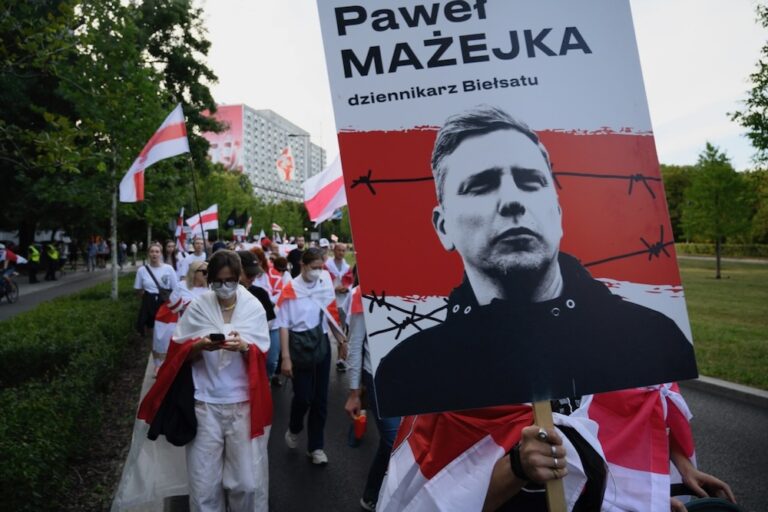(CPJ/IFEX) – The Belarusian State Committee on the Press issued a warning on 1 June 1998 to the Minsk-based independent weekly “Zdravy Smysl” for allegedly providing “distorted information” to its readers that could result in the paper’s closure. The warning came after “Zdravy Smysl” reported that Belarus President Aleksander Lukashenko was named one of the […]
(CPJ/IFEX) – The Belarusian State Committee on the Press issued a warning on
1 June 1998 to the Minsk-based independent weekly “Zdravy Smysl” for
allegedly providing “distorted information” to its readers that could result
in the paper’s closure. The warning came after “Zdravy Smysl” reported that
Belarus President Aleksander Lukashenko was named one of the 10 worst
“Enemies of the Press” in May by the Committee to Protect Journalists (CPJ).
“Zdravy Smysl” will appeal the State Press Committee’s warning. A second
warning issued before the end of the year would cause the paper to be shut
down for three months.
On 6 May, “Zdravy Smysl” quoted a broadcast by Radio Liberty (RL) reporting
on CPJ’s “Enemies of the Press” announcement, which was released for World
Press Freedom Day on 3 May. In reporting that President Lukashenko was named
an enemy of the press, RL cited CPJ’s description of a secret March
directive of the State Press Committee, called “On Enhancing
Counter-Propaganda Activities Towards Opposition Press,” as the latest
example of repeated violations of press freedom in Belarus. The RL broadcast
was quoted by “Zdravy Smysl” in a Russian translation, in which the word
“directive” (razporyazhenie) appeared in Russian as “decree” (ukaz). The
State Press Committee seized on this linguistic inconsistency to accuse the
newspaper of presenting false information to the public, in violation of
Article 16 of the press law.
In discussing the incident, Igor Chertkov, the paper’s editor, agreed that
the word “directive” was mistranslated, but he noted that the paper had not
spelled the word “decree” with a capital letter, as it would have been if it
referred to a specific legal act. Moreover, said Chertkov, an official
decree would have been attributed to the president, but his name was not
cited in this regard. Chertkov maintained that the government had seized
upon a minor linguistic imprecision as an excuse to shut down the newspaper.
Chertkov told CPJ that authorities had made several attempts to silence the
paper in the past two years. “Zdravy Smysl” regularly publishes articles
detailing press freedom violations, inhumane prison conditions and police
brutality in Belarus – information rarely made public in the Minsk press.
Although some copies of “Zdravy Smysl” are distributed free of charge, most
are sold through the monopoly state distribution network. The state collects
between 40 and 45 per cent of the profit from sales, a heavy burden for
private media. Chertkov told CPJ that last autumn “Zdravy Smysl” was fined
52 million rubles (about US$1,650) for alleged non-compliance with the
state-run distribution rules. The fine forced the newspaper to reduce its
print run from 23,000 to 10,000 copies.
Chertkov told CPJ that the newspaper’s offices were ransacked on the night
of 18 June 1997, when an unidentified assailant attacked three volunteer
workers and the night watchman, and destroyed several computers and fax
machines. Nothing was reported stolen, but one of the victims was
hospitalized with a skull fracture. According to Chertkov, the assailants
were looking for reporters’ notes and research materials. The case was
reported to the police, but to date no suspects have been arrested.


